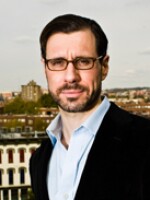MELISSA BLOCK, host:
Today in Russia, one of the country's literary giants was buried. Alexander Solzhenitsyn was a former political prisoner who went on to win the Nobel Prize. NPR's Moscow correspondent, Gregory Feifer, reports on the Solzhenitsyn funeral.
Unidentified Man: (Singing in foreign language)
Gregory Feifer: The Russian Orthodox service had all the trappings of a state funeral. At Moscow's Donskoy Monastery, where other famous cultural figures are buried, a goose-stepping military honor guard carried Solzhenitsyn's coffin before a somber-looking president, Dmitri Medvedev, paid his respects to Solzhenitsyn's grieving widow and sons.
(Soundbite of choir)
FEIFER: Many older Russians say they revere Solzhenitsyn for describing the kind of life led by the millions sentenced to the prison camp system. Former Soviet leader Mikhail Gorbachev, who many credit with having brought down communism, told Ekho Moskvy Radio that Solzhenitsyn helped lay the groundwork for the Soviet collapse by revealing to people the true nature of the regime that governed them.
President MIKHAIL GORBACHEV (USSR): (Through translator) He was one of the first people to raise his voice again the Stalinist regime and in defense of its victims.
FEIFER: Solzhenitsyn himself spent eight years in the Gulag for criticizing Soviet dictator Joseph Stalin in a letter. Solzhenitsyn was later exiled and lived in seclusion for 20 years in Vermont. After the end of communism, he returned to Russia, where he died Sunday from a chronic heart condition at the age of 89.
Solzhenitsyn's works, including "The Gulag Archipelago" and "One Day in the Life of Ivan Denisovich," helped make him known abroad as one of the Soviet Union's two most famous dissidents. The other, physicist Andrei Sakharov, often clashed with Solzhenitsyn, but Sakharov's widow, Yelena Bonner, says Sakharov respected Solzhenitsyn's personal courage.
Ms. YELENA BONNER (Widow of Sakharov): (Through translator) Sakharov said even though he disagreed with many of Solzhenitsyn's opinions, Solzhenitsyn was a giant in the struggle for human dignity in the modern world.
FEIFER: Solzhenitsyn was highly controversial. He alienated many of his supporters with his Christian moralism and strident Russian nationalism. He railed against Western liberal democracy, and after his return to Russia in the 1990s, Solzhenitsyn supported then-president and former KGB colonel Vladimir Putin.
Putin was at the Olympics in Beijing today, but he'd earlier paid his respects to Solzhenitsyn's family. Another prominent former dissident who spent time in the gulag, Sergei Kovalyov, said it's a paradox that Solzhenitsyn shared Putin's belief that the state is greater than the individual.
Mr. SERGEI KOVALYOV (Russian Dissident): (Through translator) All his life, courageous, stubborn Solzhenitsyn was persecuted by the KGB, and all of a sudden he became an ally for a pathetic KGB colonel.
FEIFER: Solzhenitsyn lived as a recluse for many years. His novel, "The First Circle," was dramatized on Russian National Television in 2006.
(Soundbite of film, "The First Circle")
Unidentified Man (Actor): (As character) (Speaking foreign language).
FEIFER: But to most young Russians growing up in a time in which Soviet history is increasingly admired, Solzhenitsyn's condemnation of the Soviet regime is losing its relevance. Gregory Feifer, NPR News, Moscow. Transcript provided by NPR, Copyright NPR.






